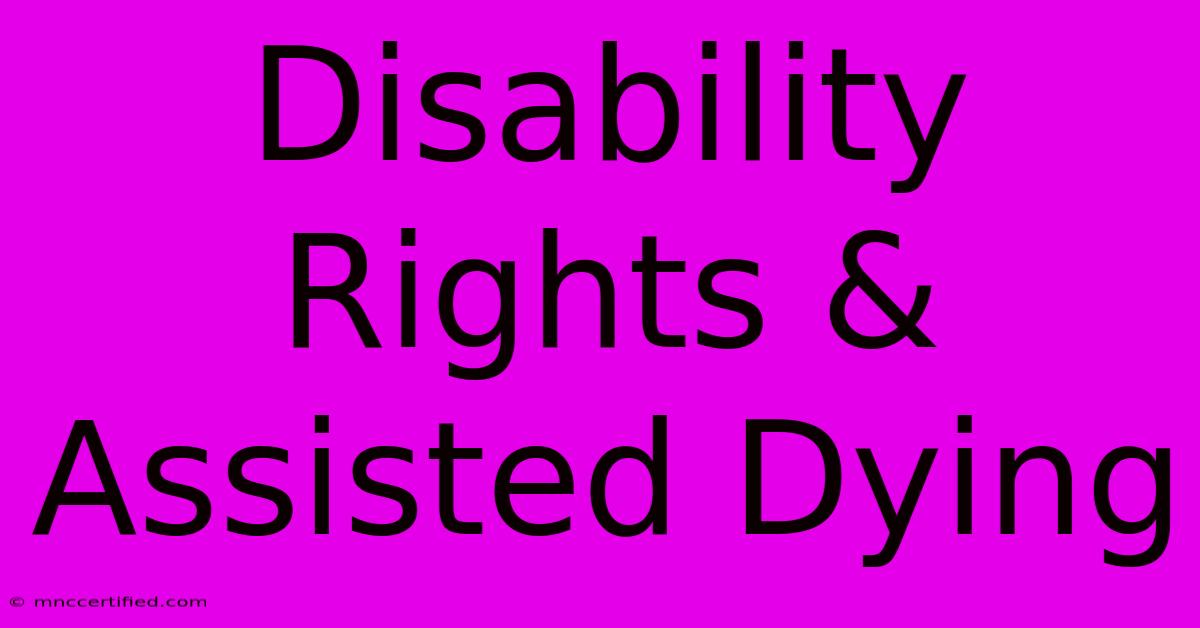Disability Rights & Assisted Dying

Table of Contents
Disability Rights & Assisted Dying: A Complex Intersection
The intersection of disability rights and assisted dying is fraught with ethical, legal, and social complexities. While proponents of assisted dying emphasize autonomy and the right to a dignified death, disability advocates raise concerns about potential discrimination and coercion. Understanding this nuanced debate requires examining both sides with sensitivity and critical analysis.
The Argument for Assisted Dying
The core argument for assisted dying rests on the principle of autonomy. Individuals facing unbearable suffering, with terminal illnesses leaving them no reasonable hope of recovery, should have the right to choose how and when their life ends. This right, proponents argue, is fundamental to human dignity and self-determination. They emphasize that:
- Relief from Suffering: Assisted dying offers an escape from prolonged and intractable pain and suffering that cannot be adequately managed by palliative care.
- Maintaining Control: It allows individuals to maintain control over their final moments, avoiding a potentially undignified or protracted decline.
- Personal Choice: The decision to pursue assisted dying should be a deeply personal one, respected by society and the medical profession.
The Role of Palliative Care
It's crucial to acknowledge that palliative care plays a vital role in managing pain and symptoms for individuals with terminal illnesses. However, proponents of assisted dying argue that palliative care cannot always alleviate all suffering, particularly existential distress or the loss of autonomy and dignity. Assisted dying is presented not as a replacement for palliative care, but as an additional option for those whose suffering remains unmanageable.
Disability Rights Concerns: A Critical Perspective
Disability rights advocates express profound concerns that legalizing assisted dying could lead to:
- Discrimination and Coercion: People with disabilities, particularly those with mental or cognitive impairments, may face pressure, whether implicit or explicit, to choose assisted dying due to societal biases and ableist attitudes. This pressure could stem from factors such as limited access to adequate support services, societal devaluation of disabled lives, or financial strain on caregivers.
- Undermining Accessibility: Resources and effort might be diverted away from improving accessibility, support systems, and inclusive healthcare to focus on assisted dying.
- Slippery Slope Argument: There are fears that legalizing assisted dying for certain conditions could gradually expand to encompass a wider range of circumstances, potentially endangering vulnerable populations.
Ensuring Safeguards
Proponents of assisted dying emphasize the importance of robust safeguards to prevent abuse and coercion. These safeguards typically include:
- Multiple medical evaluations: Requiring assessments from multiple physicians to confirm the diagnosis and the patient's decision-making capacity.
- Psychological evaluations: Assessing for depression or other mental health conditions that might influence the decision.
- Waiting periods: Implementing a waiting period to allow time for reflection and reconsideration.
- Witness requirements: Ensuring the presence of witnesses to verify the patient's informed consent.
These safeguards are designed to protect vulnerable individuals and to ensure that the decision to pursue assisted dying is truly autonomous and informed. However, disability advocates remain skeptical, arguing that such safeguards may not be sufficient to eliminate the risk of discrimination and coercion.
Finding a Balance: The Path Forward
The debate surrounding disability rights and assisted dying highlights the fundamental tension between autonomy and protection. Finding a balance requires:
- Increased Access to Comprehensive Support Services: Addressing the root causes of potential coercion, such as inadequate access to support services, disability benefits, and inclusive healthcare.
- Promoting Open and Honest Dialogue: Fostering a societal shift towards valuing the lives of individuals with disabilities, irrespective of their physical or cognitive abilities.
- Strengthening Safeguards: Continuously evaluating and refining the safeguards surrounding assisted dying to ensure they are truly effective in preventing abuse and coercion.
- Focusing on Inclusive Palliative Care: Investing in research and resources to enhance palliative care services that address the specific needs of individuals with disabilities.
The discussion must move beyond simplistic arguments and embrace a nuanced understanding of the interplay between individual autonomy, societal attitudes, and the protection of vulnerable populations. Only through thoughtful consideration of these complexities can we approach this challenging issue with both compassion and ethical responsibility. Further research and open dialogue are essential to ensure that any policy decisions related to assisted dying are informed, equitable, and protect the rights of all individuals, including those with disabilities.

Thank you for visiting our website wich cover about Disability Rights & Assisted Dying. We hope the information provided has been useful to you. Feel free to contact us if you have any questions or need further assistance. See you next time and dont miss to bookmark.
Featured Posts
-
720 N Bond St Springfield Il
Nov 30, 2024
-
Blackrock Target Income Bond
Nov 30, 2024
-
Ole Miss Mississippi State 2024 Game Prediction
Nov 30, 2024
-
Fernando Sarabia Borregos Qb Profile
Nov 30, 2024
-
Can Bonded Teeth Be Whitened
Nov 30, 2024